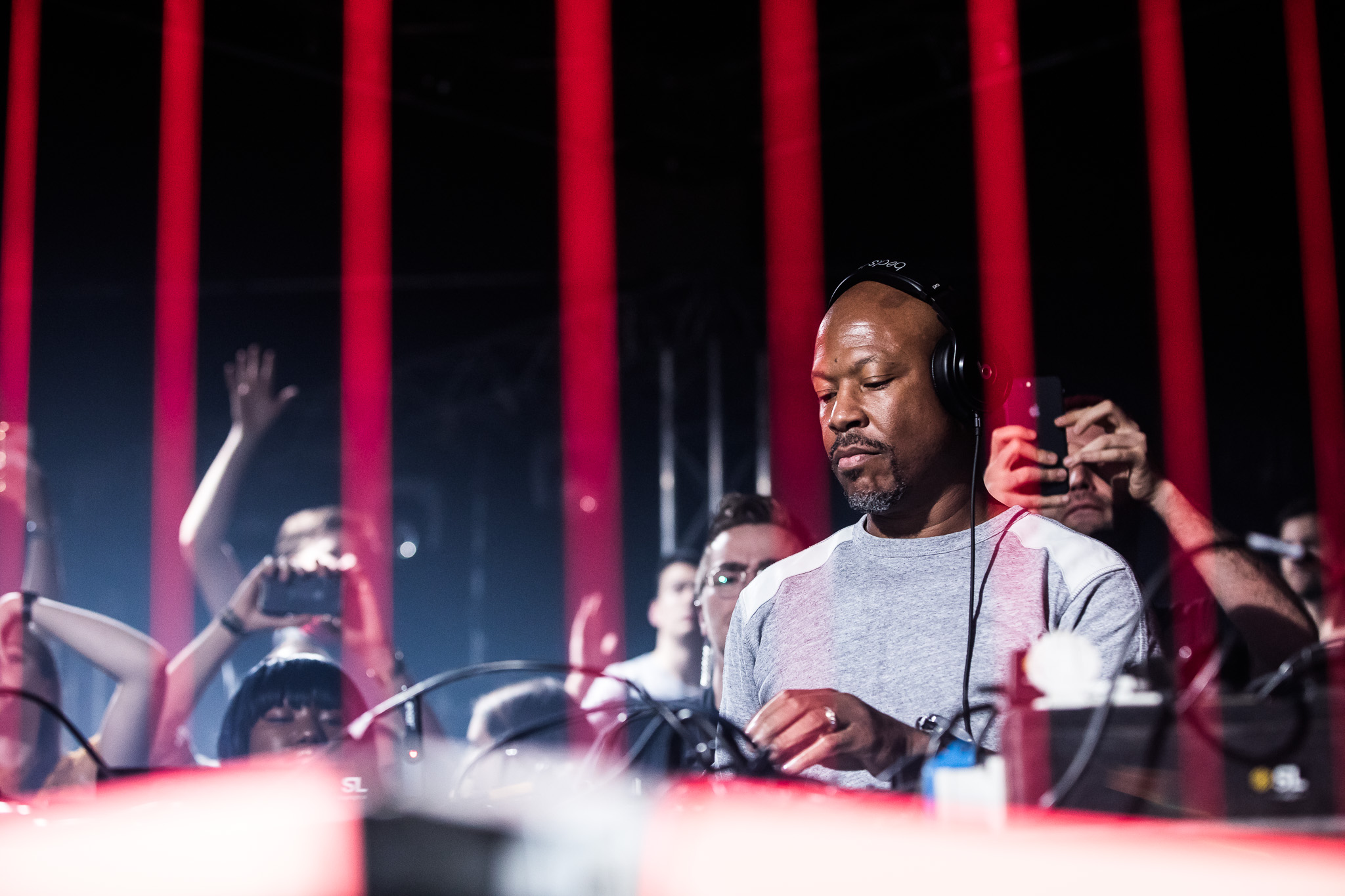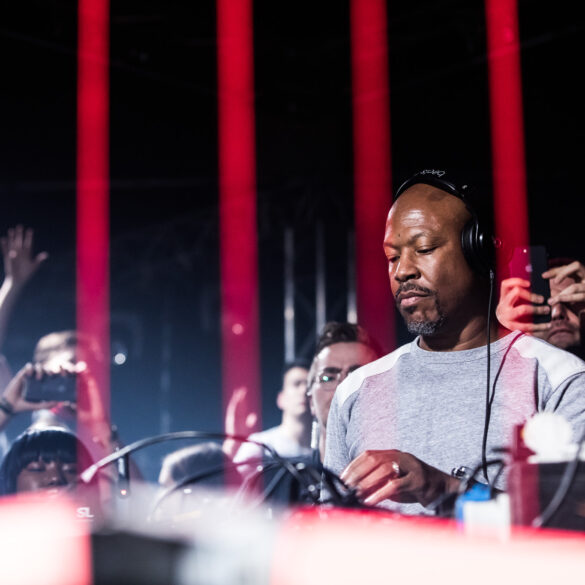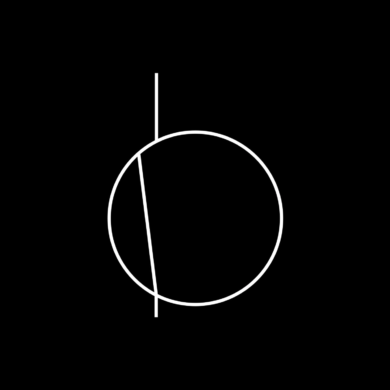I believe that once you’ve found your sound, it’s essential not to be caught up in the latest hype. If I change my foundations, then I won’t know who I am. When you don’t know who you are musically as an artist, then you also don’t know where you are going. (Robert Hood)
STRONGER WITH MINIMALISM
Repetition is hypnotic, repetition is hypnotic, repetition is hypnotic, repetition is hypnotic… Do you feel it?
Yet no one ever woke up one day saying “Let’s invent hypnotic techno”. If the aesthetic is eventually derived from the use of swinging pendulums in early hypnotherapy, the hypnotic sound can also be found in nature, such as the rhythmic ocean waves that continuously roll onto the shore, and there are repetitive passages in nearly every musical composition created within the last 100 years.
However, the techno pioneers have succeeded in making the repetition more obvious, thanks to their loops carried by the very regular four-to-the-flour drum pattern, while the minimal techno pioneers highlighted it even more, by eliminating the superfluous sounds from the repetitive structure. Hence, the creation of the hypnotic effect in techno is primarily attributed to the trailblazers of minimal techno.
It “all started” from there, kind of, but it didn’t “end” there, as other artists merged it with other ingredients to boost the effect even further, from the use of a polyrhythmic drum pattern which segments the loop in a more impactful way, to the implementation of trippy atmospheres and “magnetic” melodies. Nonetheless, in this article, we delve into the core principle: minimalism.
It is worth noting that in the early nineties, the minimal techno pioneers didn’t really think about the effect they were creating. They came to the genre with other motives. Representing Sähkö’s school, Mika Vainio, for instance, as Philus, just wanted to express musically his sterile job in the pharmaceutical industry (source here). Robert Hood, on the side of Detroit, developed minimal techno mainly as a reaction against the excessive richness of gabber, which, according to him, was making the sound “more grandiose than danceable” (source here).
Two fundamental releases in the minimal techno culture
Hood sought a return to a focus on fundamental rhythms, drawing inspiration from early funk music and African percussions, among other sources.
In 2019, we had the chance to have a phone call with him. At that time, our blog didn’t exist and we were preparing an article for Trax Mag, now defunct. Back then, the French magazine only agreed to publish a very small portion of the discussion, not that the whole part was not interesting, but because the small-format article, more entertaining, was privileged in the mag’s strategy. It was not the only one to work as such, and we ended up creating our own media partly for the freedom to explore topics more thoroughly.
When our blog was created, we asked permission from Trax Mag’s chief editor to publish the whole discussion inside, a “director’s cut version” sort of, which he approved. Yet we never found the time to do it, until now…
As you can imagine, it has been a very special phone call: next to being a musician and M-Plant label owner whom we truly admire, Robert Hood is also a father and a priest with a lengthy career. He’s first and foremost a legend for us, and ultimately a fascinating interlocutor. To prepare for this interview, we created many technical questions linked to minimalism, but during the chat, the man gave free rein to his bright thinking, showing that the essential was elsewhere. Indeed, the American veteran has much more to offer than his technique: his message is deep, caring, inspiring, and reminds us of the significant connection between hypnotic techno and the genuine human dimension…
In the end, we covered different topics linked to his various “roles” and hope that you will enjoy the sequence as much as we did.
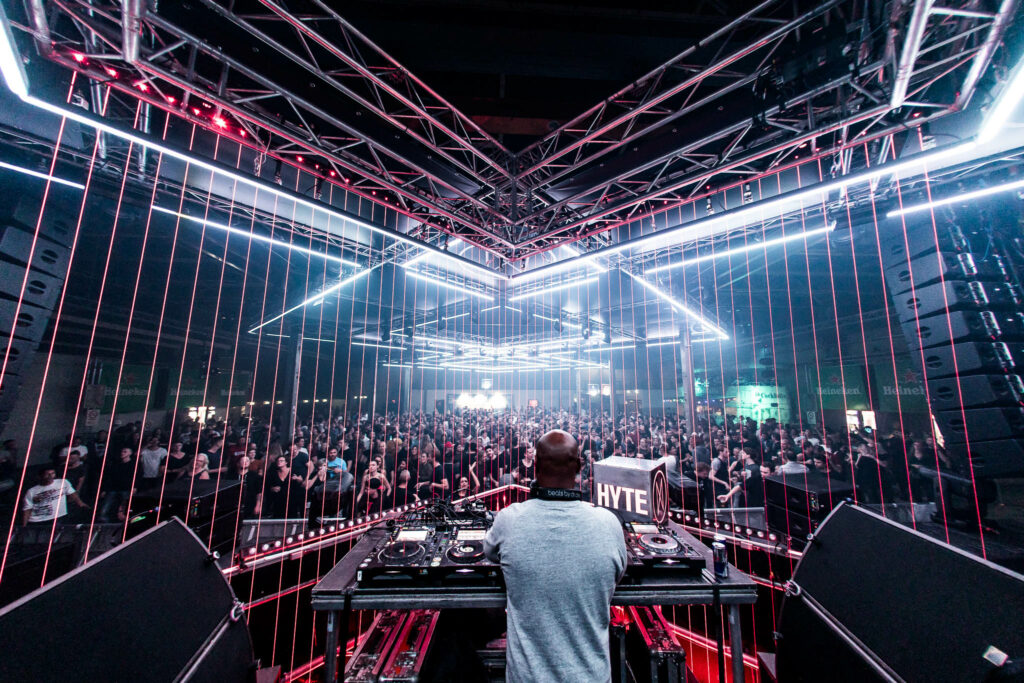
THE PHONE CALL – FULL CONVERSATION
“Internal Empire” on Tresor is a very important record for the minimal techno community, as evidenced by its regular re-issues…
Robert Hood: I feel – and Dimitri Hegemann feels [Ed: Tresor’s founder] – that it’s necessary to re-release it to dig out this special time in techno and maybe to educate a little bit today’s young audience. When I’m DJing now, I’m looking out into a youth who sometimes doesn’t know where techno comes from and what the history of techno and electronic music is. They don’t know some of the records I’m playing, such as “One Touch”, “Museum” or “Unix” from “Minimal Nation“. I’m always happy to give a new life to my early albums as they have been so important in the evolution of my music. It’s sometimes necessary to just drop a line back to where I come from.
I enjoy how you defined minimal techno in your 2014 RBMA Lecture, saying that “minimalism is a creation of rhythm inside a rhythm inside a rhythm, with an effect of trance” (“like those pictures where, if you stay long enough, you see another hidden one inside”). Do you follow what minimal techno has become over the last decades?
Robert Hood: Yes, I pay attention. I constantly examine where my music comes from, how it has grown and changed over the years. I guess I can’t help but do that. But I also try to stay true to who I am, true to my musical roots of the early days of minimalism. There are times when I don’t feel so minimal and want to express myself differently, but coming back to Detroit is important to me, because that’s my anchor. Even before I started to make music, what I was listening to when I was just buying records built my sound. It’s important for me to remain connected to it and not get lost in absorbing somebody else’s perception of who I should be. And so, again, I’m constantly examining how my sound is evolving, as well as how close I am and how far away I am from being myself and how I have grown.
The hypnotic sound of today is different from the one which you created in the nineties with Jeff Mills and Mad Mike: the Italian scene for instance, with artists such as Donato Dozzy, Dino Sabatini, Ness, Luigi Tozzi, Claudio PRC, injected deep drones and atmospheres into it. Isn’t evolving with the new trends also an important aspect of being an artist?
Robert Hood: Well, the foundation of my music remains very important to me: the minimal techno from the nineties is my signature sound. It’s important to me to also evolve and change, but not to change broadly, not to change suddenly, not to change for example my hip-hop with the new artists and DJs that are coming up. I’m constantly examining and comparing the music to make sure that the new sounds and new eras are not changing me. You know, the music itself is always very interesting and very inspiring, but I believe that once you’ve found your sound, it’s essential not to be caught up on the latest hype. If I change my foundations, then I won’t know who I am. When you don’t know who you are musically as an artist, then you also don’t know where you are going.
Not everyone is aware of your connection to hip-hop, while you started your career by producing rap tunes. There was already some Housey flavour into them, so I guess it was a continuous way for you to move on to house music after that…
Robert Hood: Absolutely. About hip-hop you know, there has been a ride in the late eighties I guess. But to me, house and hip-hop music both have always been phenomenal, from the days of Afrika Bambaataa, Soul Sonic Force, Planet Rock and even back to Sugar Hill Gang rapping over Good Times by Chic… You had a disco record, a disco break and three guys rapping over it: I loved it and it has been natural for me to follow the move. Through the years, I’ve noticed how rap lyrics go so well with the beat. I felt like I had to experience that although I never really wanted to be an MC: I just couldn’t find anybody to do it for me when I started to produce so I did it myself.
Later on, I just turned away from that, let the rappers rap and let me be the mixer boy: I just wanted to be on the drum machine. I became a DJ and producer. My first DJ gig was at a Reggae club where I played hip-hop and reggae on Friday night. I went into this in a different way than most Detroit DJs. Everybody else came from various music but I came from a hip-hop path.
What about turntablism, “the magic world of the DMCs“, the scratching and the beat-juggling, so dear to Lory D, who inspired the Italian scene? Have you ever been tempted to experiment with this fun side of mixing, coming from the hip-hop movement?
Robert Hood: Yes, a little bit. I’ve been there over the years, but I try not to get caught up in that so much as I want to keep the music clean and pure, I guess you can say. But there are times when I just want to break out and mix hip-hop, like rap lyrics into house and techno, and do a little bit of scratching. I wished I had more time to do my research and really experiment. There are so many other things I would like to do in a DJ set, such as a mix between James Brown or Marvin Gaye with techno or house and see what happens, see if we can cause an explosion, just like merging different chemicals together. To make the scratching elements out of that is definitely just boiling inside of me, waiting to come out. I do a little bit of it sometimes. But for the most part, I try to keep it pretty clean and pure.
Demo of turntablism by The Invisibl Skratch Piklz
The jump from house music to minimal techno required a certain openness. Modeselektor said about you that you are one of the rare icons of those years who never stopped renewing themselves. Do you agree?
Robert Hood: It’s very intentional in my approach to be a new creature every day. To quote a passage from the Bible: “If any man be in Christ, he is a new creature: old things are passed away; behold, all things are become new”… That’s what I pray and meditate every day: I made the commitment that my marriage is renewed, my spirit is renewed: I’m not the same creature that I was last year and the year before that. So I’m expecting intentionally new sounds, new inspiration for this new year and whatever I did last year is gone. I’m fed and proud of what I did last year, five years before, ten years before. I’m now also looking forward to going higher, not to be complacent and just satisfied with where I am. I’m renewing myself and I’m also escalating a mountain: when I wake up tomorrow, I won’t be the same and I meditate on that.
You are also open to improbable experiences, such as delivering a sermon at St-Thomas Church in Berlin, for the 29th anniversary of the Wall Fall, immediately followed by a techno set on the spot… I personally don’t go to church but this would have definitely convinced me to try…
Robert Hood: It’s a vision of mine that I’ve had for many years which took place when I had the opportunity to preach and Berlin is where the vision came into wishing. So I was very humbled to be able to give a message in front of the people of Berlin, in that beautiful setting. I would like to do it again one day, as much as I can, to tell people about Christ and speak about the Gospel, and how it has such a profound effect on my music, my life, my marriage, my career; on everything. Everything in my life has changed as a result of being jogged in God’s hand and being plugged into his spirit.
I try to see the link that you make between religion and music, and think of these words from my dad: “If you replace each feeling of fear with a feeling of love, your life will forever change”. The way you transform the energy of music into love may offer a solution for overcoming negative thoughts. Do you relate to that?
Robert Hood: Yes, I absolutely relate to that. You know, there is a passage in the Bible that says: “God has not given us the spirit of fear, but of power and of love and of a sound mind”. When you say “power”, it’s under the noble meaning: it means to be blessed and to be empowered. When you know God: he is love and everything about God is the spirit of love. If you think of the famous verse of John 3:16: “For God so loved the world, that he gave his only begotten Son, that whosoever believes in him shall not perish, but have everlasting life”, you realize that love is all that we need: just the spirit of love and to understand what love is and what everlasting life and salvation is. There is also “the power of the sound mind”, representing the self-control to be anchored and grounded into the world of God. The more you practice, the more efficient the self-control is. Having a “sound mind” is nothing greater than having a spirit of peace, peace in my life, peace in my family, and then peace in my community and peace in the world. That’s so needed. We have to seek after God and that is presented in our DJ sets: my daughter and I want to implant, if you will, in people’s minds and people’s hearts, while we play music, that spirit of well-being, a spirit of tranquillity, a spirit of being empowered by God’s love. That’s the paramount message of our record label, of our ministry and our DJing.
How is it to work with your daughter?
Robert Hood: My daughter, she takes me to another level. She has injected a new energy, a youth into my sound and she makes me better, in the meaning that she causes me to take myself apart. I’m also examining myself in a way that if it doesn’t move her, it can’t move people her age. Then, I’ve to go back to the drawing board and try again. It’s very important for me to make music that pleases her: she’s like a litmus test of what I’m doing. I could be making a beat in the studio and she could be listening outside, somewhere in the house: she would suddenly come in and say “Wait, you’ve got something here”, then I know I’m in the right direction. She’s my guide, so to speak. And she keeps me young…
Our children rejuvenate us, always… Your daughter and you mixed for Boiler Room a while back. Let’s talk about this session a little bit: first of all, how did you prepare for such an event?
Robert Hood: That’s interesting, I didn’t have time to really prepare it. My daughter was working with a new brand of DJ controller with her iPad and we really didn’t bounce off one to another; I did my part of the set and then she did her part and then I came back to my part and that was it mainly… We didn’t know what we wanted to play; it was very experimental. We didn’t say “Okay, we’re gonna start off with this or that”: it just came together. I regularly listen to her practising in her room and she listens to me practising in my studio, so we just said “Okay, I’m gonna play maybe twenty to thirty minutes and then you come on and do your thing.” We didn’t ask each other “What are you going to play?” I had no idea what she would play and we didn’t like to plan or map the event so much. We just wanted to see what would just happen and it was completely unrehearsed.
That’s impressive; I would have been very nervous on my side without any preparation. I understand that you weren’t, based on your huge career, but it must have been less easy for your daughter, who came more recently into the game. How did you make her feel at ease?
Robert Hood: Yes, she was very nervous. You know, when we got to the Boiler Room stage, she came into my arms to express her nervousness. I just said to her: “It’s okay, you know, it’s okay to be nervous, I’m nervous for you, but it’s a good nervousness, it’s a good energy: people just want to hear the music and you do what you do. Just try to imagine yourself in your own room, that you got some friends over, listening to you, with whom you’ve been hanging out.” That’d be the mindset that I try to keep myself in and where I try to place my daughter in. I also added: “Don’t worry so much about being technically correct and just focus on having a good time and just have fun…” And that’s the main thing, and that’s what I try for myself: it’s not always about being so technically correct, just having a good time and enjoying yourself and not getting caught by the hype of what people expect from you.
It’s not always easy to apply wise spiritual thoughts: do you always mix in peace on your side or do you also experience stage fright at times?
Robert Hood: Well, you know what? Fear and doubt, they will always try to make their way to our minds and hearts. But all these negative emotions are like “birds” which fly around your head and try to build a nest in your mind. The thing is: it’s up to us, not to allow those “birds” – those negative emotions – to come in. The way we push them away is with the words of God: we have to pray and meditate when the fear tries to come in. Knowing what the words of God say is critical to combat any negative emotion. We all have them; fear, anger and spiritual anxieties, but we also have the power to fight against them.
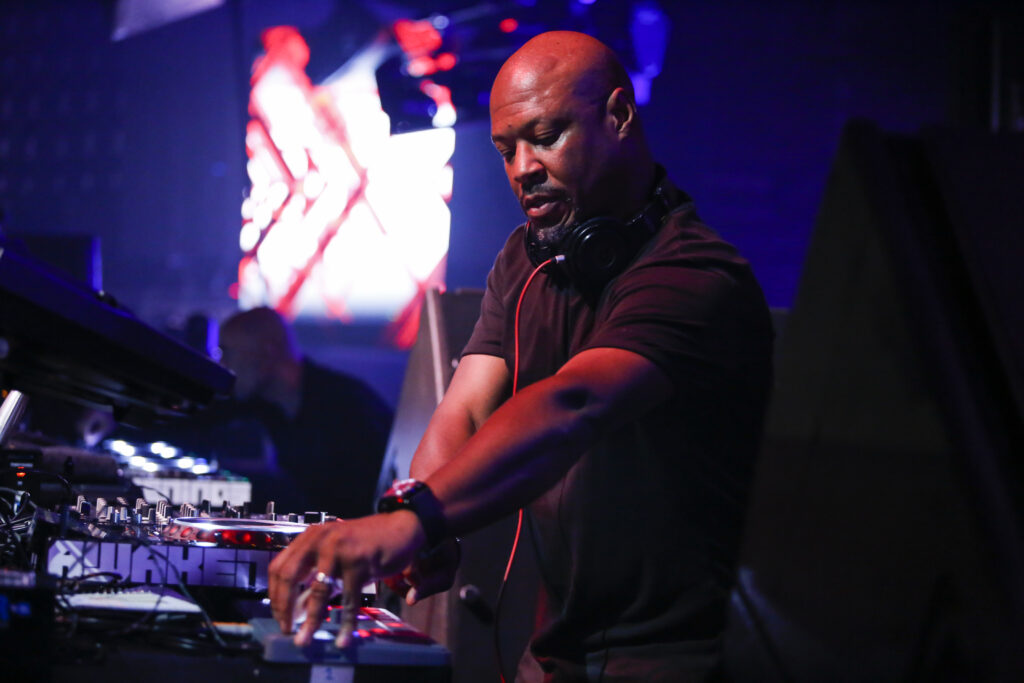
Let’s talk about the music you play. Grandmaster Flash once said: “I don’t want to be classified as an old school or new school DJ. I want to be classified as an “all school” DJ who plays it all. I also want to learn to mix house music in my own fashion.” Do you also see yourself as an “all school” DJ?
Robert Hood: I believe that I can play music for everybody. I can play at a wedding, a high school dance, a football game, a birthday party… You know my mother-in-law’s 70th birthday party took place and I’ve been nasty: I put together some seventies and eighties music for that. You have to be versatile as a DJ in my thinking: you have to be ready for whatever. And that’s how I taught my daughter to be. It has always been my belief as a DJ, since I’ve been listening to people such as The Electrifying Mojo, who have such an eclectic musical taste, covering everything, even country music, rock music, and reggae music. When you hear something which hits your soul, you want to share it with the world. I don’t like to be bargained, I’m only about minimal music or certain music from a certain era, like the golden era of hip-hop or futuristic music. I like the term that says I’m an “all school” DJ and I want to be able to play whatever it is that I feel like playing…
Do you still mix at home sometimes, or do you only mix outside in the clubs?
Robert Hood: There are times when I just want to play music for myself at home and I can play different types of sets other than minimal techno or house. There are times when I just want to play electro, when I want to hear music like some Afrika Bambaataa. There are times when I will just play some sets of hip-hop. I jump from one music genre to another; from disco to hip-hop to minimal to house. I do that with all within, maybe 4-5 hours.
You’ve globally explored all possible formats as a DJ: clubs, festivals, podcasts, studio mixes, radio shows, filmed shows… Is there one which you prefer and why?
Robert Hood: I enjoy a lot the intimacy of the clubs, where you can have a direct connection with the audience, such as in the Panorama Bar or the Tresor Club. It’s almost like preaching in a church, in a small intimate one, where you can exchange the energy between yourself and the audience. With festivals, there has to be a certain type of energy to get that kind of connection, because you are so far away from the audience, with the light show, the smoke and everything. So sometimes it’s harder to develop a direct line of communication between yourself and the audience in such events. When it works, it can be explosive though, because the energy in such places has the potential to create a different type of magic, which can bring a lot of emotions. Some really great memorable moments can come out of it. But I guess – if I have to answer your question – that I prefer the clubs, because again it’s so much easier to create these memories, like for instance what Todd Terry has been able to create as a resident DJ at Studio 54. You have time to experiment and the crowd is more forgiving when you’re experimenting in the clubs, while you almost have to perform like in a concert when you are at a festival. And that’s also another reason why I prefer mixing in a club.
You’ve been doing also some very charismatic studio mixes, thinking for instance of your entry in the treasured DJ-Kicks mix series. How did you approach this project?
Robert Hood: I wanted it to be unique; I didn’t want something that’s so typical to my normal sets but I wanted to perform it at least in a way that people know how I play. So I wanted the performance to be very much in that vein of how I normally perform, but with a slightly different set of sounds and tracks. And so, as I began to pick up these tracks, I wanted them, not just to represent the current music, but my music from the last – I would say – seven or eight years: it’s the period where I had a spiritual transformation, living in Alabama and getting closer to God. My mix sort of reflected that time. Then, the process was in what order should I put these tracks together and how I was going to implement the next track, to create a build-up until a certain climax. So it started with very minimalistic and dark vibes and gradually built up in a way that symbolised my spiritual transformation.
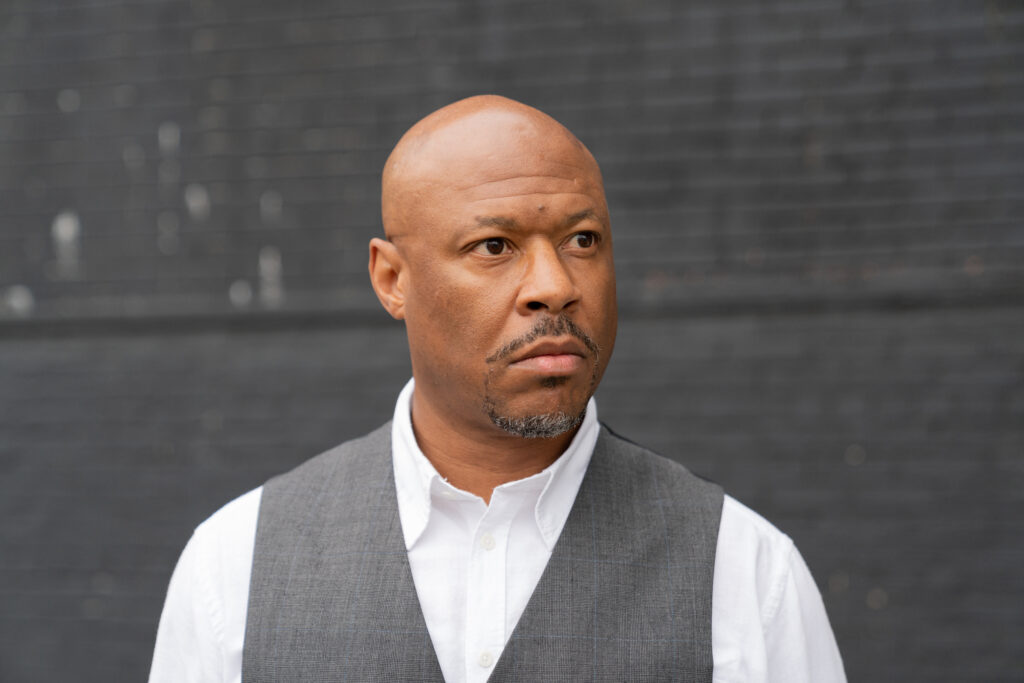
WRITING BY: CEDRIC FINKBEINER | 26 FEBRUARY 2019
(REWRITTEN IN MARCH 2024)

